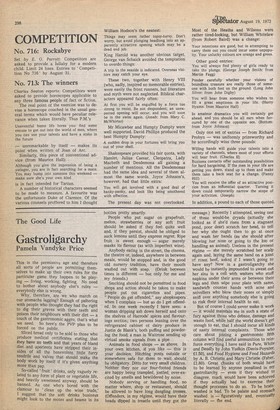The Good Life
Gastroligarchy
Pamela Vandyke Price
This is the permissive age and therefore all sorts of people are permitting themselves to make up their own rules for the particular game they happen to be playing — living, working, fighting. No need to bother about anybody else's rules — everybody else is wrong.
Why, therefore, are we who march on our stomachs lagging? Enough of paltering with people who thought they had the right to dig their graves with their teeth and poison their neighbours With their dirt — a touch of the gastronomic aggro, that's what we need. So here's the PVP plan to be forced on the public.
Sliced bread only to be sold to those Who produce medical certificates stating that they have no teeth and that years of bland diet and aperients have stripped their insides of all the benevolent little furry tendrils and valves that should make the body work by itself if it's given anything more than pap So-called 'fruit' drinks, only vaguely related to any form of plant or vegetable life, and heavily sweetened anyway, should be banned. As one who's bored with the clamour to clean up the wine trade,' I suggest that the soft drinks business might look to the motes and beams in its bottles pretty smartly.
People who put sugar on grapefruit, melon, strawberries or any soft fruit should be asked if they feel quite well and, if they persist, should be obliged to suck lemons until they express regret. Ripe fruit is sweet enough — sugar merely masks its flavour (as with imperfect wine).
Anybody eating in the street, the cinema, the theatre or, indeed, anywhere in between meals, would be stopped and, in the good old nursery tradition, have their mouth washed out with soap. (Drink between times is different — but only for me and my friends.) Smoking should not be permitted in food shops and action should be taken to make people put out cigarettes and pipes. "People do get offended," say shopkeepers when I complain — but so do I get offended, In one week recently I have seen: a woman dripping ash down herself and onto the shelves of Harrods' spices and flavourings section; two persons leaning over the refrigerated cabinet of dairy produce in Justin de Blank's, both puffing and powdering the food; a man in Waitrose sending up virtual smoke signals from a pipe Animals in food shops,— as above. In your own kitchen, if you like — this is your decision. Hitching posts outside or somewhere safe for them to wait should be obligatory. Ditto for very small children. Neither they nor our four-foOted friends are happy being trampled, jostled, over-excited by smells and bewildered by noise.
Nobody serving or handling food, no matter where, shop or restaurant, should be allowed to have long dangling tresses. (Offenders, in my regime, would have their heads dipped in treacle until they got the message.) Recently I attempted, seeing one of these would-be dryads (actually she looked as if she'd risen from a stagnant pond, poor dear) scratch her •head, to tell her why she ought then to go at once and wash her hands (as she shoulá after blowing her nose or going to the loo or handling an animal). Useless in the present regime — she merely scratched her scalp again and, laying the same hand on a joint of roast beef, asked if I wasn't going to have any? Now in a gastroligarchy she would be instantly impounded to sweat out her sins in a cell with waiters who stuff napkins under their arms or between their legs and then Wipe your plate with same, sandwic'h counter hands with acne and snivellers who blow their noses or simply sniff over anything somebody else is going to risk their internal health to eat.
But of course I could never make it work — it would maintain me in such a state of fury against those who debase, damage and waste food, while half the world doesn't get enough to eat, that I should incur all kinds of nasty internal complaints. Those who Care about joining a gastronomic fifth column will find useful ammunition to reinforce everything I have said in Pure, White and Deadly by John Yudkin (Davis-Poynter, £1.50), and Food Hygiene and Food Hazards by A. B. Christie and Mary Christie (Faber, £1.80). Great chunks of both would have to be learned by anyone penalised in mY gastroliarchy — even if they wished to disagree, much would have been achieved if they actually had to exercise their thought processes to do so. To be brainwashed is bad. To be palate and stomach washed is — figuratively and, eventuallY literally — the end.
































 Previous page
Previous page